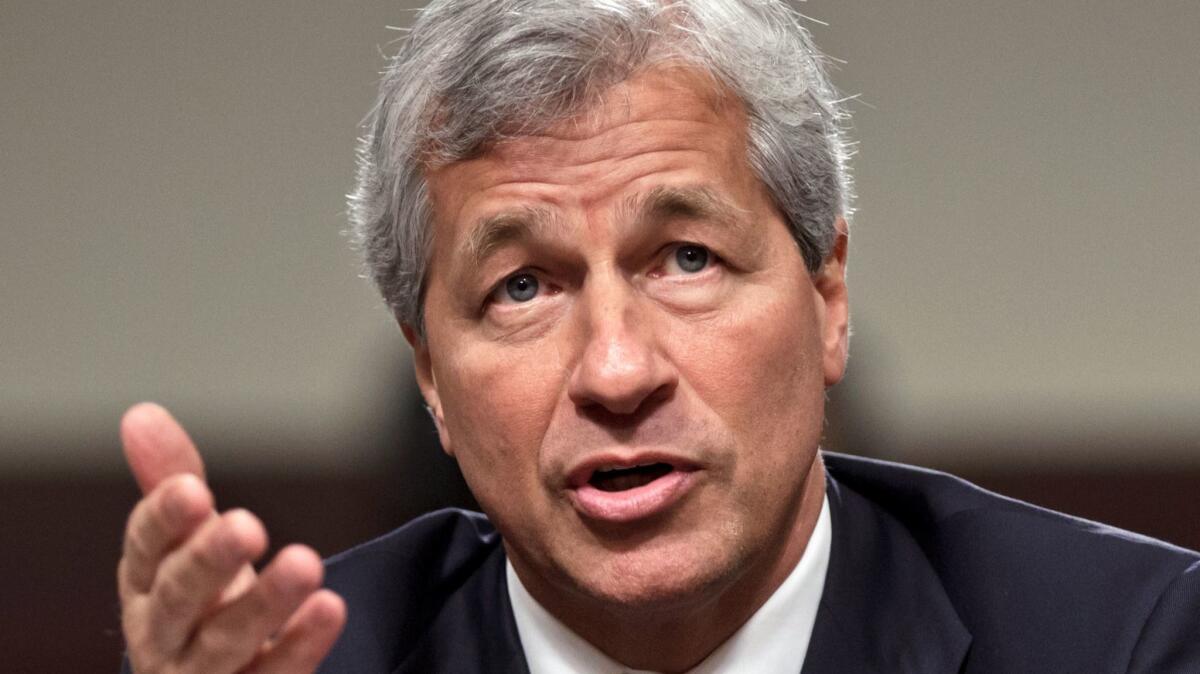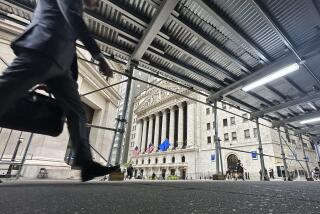Column: Jamie Dimon claims the corporate tax cut is all about helping workers. Don’t believe him.

One of the most famous lines associated with a government sex scandal was uttered in 1963 by Mandy Rice-Davies, a party girl and peripheral player in the Profumo affair, which helped bring down Harold Macmillan’s Tory government. Informed during an appearance on the witness stand that one of the aristocrats snared in the scandal had denied knowing her, she giggled and replied, “Well, he would say that, wouldn’t he?”
The phrase instantaneously entered the British political lexicon. But it came swimmingly to mind Wednesday when I read an op-ed by Jamie Dimon, the respectable chairman and CEO of JPMorgan Chase. The piece on the NBC News website was headlined, “The real beneficiary of corporate tax reform? American workers.”
I thought: He would say that, wouldn’t he?
I’ve been beating the drum to put our individual interests aside and do what is best for the country as a whole.
— JPMorgan Chase CEO Jamie Dimon, masquerading as a man of the people
Dimon’s op-ed, which he wrote wearing his hat as chairman of the Business Roundtable, is a full-throated defense of the sketchy “framework” for tax cuts issued last month by President Trump and congressional Republicans. The framework concealed its impact on middle- and lower-income Americans behind a scrim of hand-waving and magic asterisks; Dimon takes these subterfuges and runs with them.
“The framework has all of the key ingredients to fuel economic expansion,” he writes: “A business tax rate that will make the U.S. competitive around the world; provisions to free U.S. companies to bring back profits earned overseas; and importantly, tax relief for the middle class.”
He would say that, wouldn’t he?
Experts at the authoritative Tax Policy Center, a joint effort by the Brookings Institution and the Urban Institute, came to a different conclusion. They found that by 2027 the top 1% of American income earners (income of $732,800 and up) would pocket about 80% of the tax plan’s benefits. Despite what Dimon says, their gain is a loss to the average American worker.
Nevertheless, Dimon couches his pitch as one of self-abnegation. As chairman of the Business Roundtable, he writes: “I’ve been beating the drum to put our individual interests aside and do what is best for the country as a whole. Tax reform is important because strong businesses create jobs and higher wages.”
Leaving aside his faux description of the tax cut plan as “tax reform,” let’s examine how Dimon skates his way around hard reality.
Start with his assertion, based on an Ernst & Young analysis done for the Roundtable, that “a competitive 20% corporate tax reduction could support the creation of as many as 2 million new jobs if the tax savings went to new job creation.” Emphasis added, because that’s an “if” as big as the Ritz.
We know this because history tells us so. Dimon observes that in a recent Business Roundtable survey, “76 percent of CEOs of leading U.S. companies say that they would increase hiring if tax reform were enacted, and 82 percent would increase capital spending.”
Should they be believed? Long story short: no.
In 2004, Congress enacted a one-time amnesty allowing U.S. companies to repatriate earnings parked abroad at a bargain tax rate — 5%, rather than the top rate of 35%. Big business had lobbied for the break by pledging that the domesticated billions would be used to invest in their business and add jobs.
Instead, corporations spent the money on stock buybacks to benefit their shareholders and to fatten executive pay. A 2011 Senate subcommittee report determined that the 15 biggest companies taking advantage of the tax holiday, including Pfizer, Hewlett-Packard and IBM, actually cut jobs and reduced research spending. Between 2004 and 2007, IBM, which repatriated $9.5 billion, reduced its U.S. employment by 12,830 workers, or more than 9%. Its share buybacks increased from $7.3 billion in 2004 to $18.8 billion in 2007.
“There is no evidence that [the tax break] increased U.S. investment or jobs, and it cost taxpayers billions,” a U.S. Treasury report determined. That hoard of what USC business professor Edward Kleinbard calls “stateless income” now tops $2.6 trillion.
As it happens, a similar tax amnesty for stateless income is a linchpin of the framework’s corporate tax cut. The document says foreign assets held in illiquid form will be taxed at a lower rate than conventional earnings, though it doesn’t say how low. Corporations would be allowed to spread out the tax on those earnings over several years, another tax break.
Dimon grouses that the U.S. tax system has “trapped more than $2.6 trillion outside the U.S.because American companies are penalized for bringing profits earned abroad back home.” That’s one way of looking at it. Another way is to say that American companies have chosen to leave those trillions in bank accounts abroad in order to avoid taxes on it. They’re responding to an incentive, but it’s their choice, not an act of God that leaves the money there.
Dimon further asserts, “under our current system, workers bear up to 75% of the corporate tax burden through lower wages.” His source for this is a 2006 study by economist William C. Randolph of the Congressional Budget Office.
But as Harry Stein of the liberal Center for American Progress points out, that paper wasn’t an official CBO analysis and is flatly contradicted by the official CBO analysis, which reported last year that almost 80% of the total corporate tax burden was borne by households in the highest 20% of income earners, and 47% by households in the top 1%. We can safely assume that Dimon, who collected more than $27 million in compensation last year, is a member of the 1%. So how does his support of a corporate tax cut square with his plea to put “individual interests aside and do what is best for the country as a whole”?
Pleas by big business for a tax break because they’re “uncompetitive” under the current system—one of the bedrock themes of Dimon’s op-ed—need to be taken with a beaker of salt. The truth is that U.S. corporate profits have been on a tear under the current system, reaching a record $1.8 trillion in the first quarter of this year. Businesses have more than enough money to fund all the internal investment and job growth they wish. Giving them just a little bit more in the form of a corporate tax break would be good for their shareholders and CEOs, but still leave taxpayers and workers holding the bag.
Any argument you hear to the contrary should be greeted with Mandy Rice-Davies’ timeless quip. They would say that, wouldn’t they? They’d say anything to get a tax cut.
Keep up to date with Michael Hiltzik. Follow @hiltzikm on Twitter, see his Facebook page, or email michael.hiltzik@latimes.com.
Return to Michael Hiltzik’s blog.
More to Read
Inside the business of entertainment
The Wide Shot brings you news, analysis and insights on everything from streaming wars to production — and what it all means for the future.
You may occasionally receive promotional content from the Los Angeles Times.











